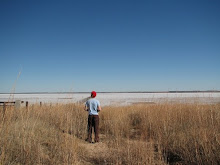
2002's "Minority Report" is one of Steven Spielberg's darker action flicks. The film was "bleech-bypassed" during post production to give it a dark feel that made the movie look almost black and white. It is considered very unique and paints a bleak view of the future.
The colors in the movie are very desaturated which gives it a dark bluish tint that resonates throughout the movie. The futuristic world created by Spielberg is an example of a mix of utopia and dystopia.
The year is 2054 and Tom Cruise is Pre-Crime agent John Anderton, who arrests people of murders before they are committed thanks to the three "pre-cogs" (kids of drug abusers, who are "blessed" with visions of murder in the future).
The world created in 2054 is high-tech, but not too preposterous. People still live as they do only with more technology. They do not drastically change their lifestyles as we see a lot in sci-fi movies.
The Pre-Crime division has eliminated murder in Washington D.C. in it's six years of service. The division is on the brink of going national and is therefore scrutinized by Department of Justice agent Danny Witwer (Colin Farrell).
Anderton is soon accused of murder three days into the future. He must go on the run and figure out how to clear his name. He does not even know the man he is supposed to kill.
The movie raises interesting questions about predetermination and destiny. If he had not been accused of murder, would he have actually committed it? The likelihood is that he wouldn't considering he did not know the guy.
The question is that of free will. Do we have a choice to change our "destiny?" Simply accusing Anderton leads him into a situation where he is forced to choice whether to murder this man (a very emotional choice at that).
All those that Anderton arrested did not actually do anything, yet they have been arrested. Could the pre-cogs be wrong or tampered with?
This movie ponders many questions and leaves you wondering in the end about free will and how we can alter the future by decisions we make. I love futuristic movies that ponder questions of reality, so this is right down my ally.
As for the content of the movie, it is loaded with action and futuristic violence involving jet packs and a freakin' awesome shock wave gun (coolest part of the movie). The technology is stunning and believable for what is nearly 50 years away.
I did not like the score created for this movie. It felt like a lot of the music did not apply or fit too well. It was done by the legend John Williams, but it simply did not add much to the film. The music was too opera-ish. It should have been the music of a classic film set in 1700's England. I was not pleased with this and felt like the movie would have been that much better with an average action movie score.
Another problem I have with this movie was the 30 minute lull at the end. This seems to be a common thing with Spielberg's latest movies (cough, cough "Munich" - that thing lasted forever). I thought the movie could have ended about five minutes after Anderton's confrontation with the guy he was to murder. Speilberg could have shortened this ending because in 30 minutes we don't learn that much.
It could have been squeezed into five minutes. The movie seems to take a boring turn at this point and fails to answer any questions we hadn't figured out already. Other than that and the music, I would say this is one of my favorite Spielberg movies, especially in recent years.
The action and futuristic world are spot on and Cruise is great as always. Throughout the movie, I tried to gather an evaluation on Farrell, but I still can't pinpoint it. I was looking for something to make him not live up to his negative reputation. I don't know. I still can't figure out if he is that great of an actor. Hard to tell in this one.
"Everybody runs."
4 of 5 stars

No comments:
Post a Comment